All Our Tragic (2015)
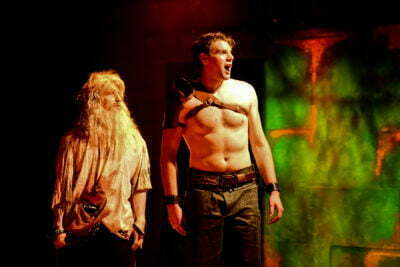
Adapted and Directed by Sean Graney
Produced by The Hypocrites, Chicago
Tribute to the Ancient World Earns Its “Epic”
The Hypocrites artistic director Sean Graney’s attempt to replicate an ancient Dionysia festival attracted lots of positive attention last fall. In case you missed it, or want to go again, now is your chance, because The Hypocrites are remounting their twelve-hour mishmash of all thirty-two complete surviving ancient Greek tragedies. The massively ambitious project is a wonder of storytelling and theatrical hospitality, similar to The Hammer Trinity at the House Theatre earlier this year. With athletic, versatile actors and delightful costumes and props, All Our Tragic showcases the imagination, innovation, and sense of sharing unique to live theatre.
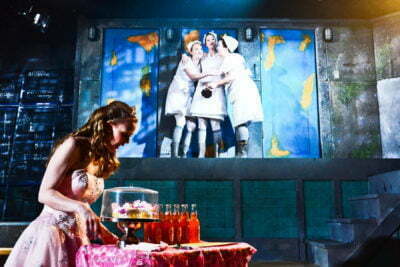
The day is divided into four parts, and the playbill tells us to have fun watching them. A strong sense of play is present throughout the epic, but especially in the first part, Prehistorics, which is also the weakest structurally. While the other three parts, Politics, Patriotics, and Poetics center on Thebes, the Trojan War, and the House of Atreus respectively, Prehistorics is a catch-all category for the remaining plays, loosely connected through Herakles and female characters who were unrelated in classical mythology, but here are called the Seven Sisters, and magically age at half the speed of normal humans. Graney significantly altered most of the myths while attempting to keep the core message as he saw it in each, and was mostly successful. In his version, the Seven Sisters are fleeing, Daniad-like, from cyclops abductors descended from the evil necromancer Eurystheus. After Herakles helps them to slay their pursuers, Eurystheus puts a curse on the Seven Sisters so that they will die in the order in which they were born, which is basically to provide us with a sense of progress over the next seventy years.
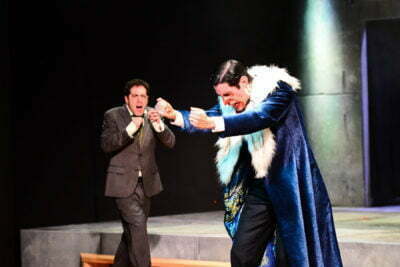
Also guiding us are the Odd-Jobs (Ann Delaney, Lauren Vogel, and Kate Carson-Groner), a chorus who play numerous instruments and keep a tally on a chalkboard of who died, which I am told is new to the remount. Their use of an accordion and a banjo provides a sort of sonic Brechtian association in some scenes, which works nicely with The Hypocrites’ sense of humor, though their use of Mozart’s Queen of the Night aria might have been better saved for the appearances of Klytaimnestra and Elektra (I’m following their lead on spelling). Allison Siple, Mieka van der Ploeg, and Alice Low’s costume and wig design, which cover more than fifty characters, combines modern dress with the vaguely mythic, creating a unique world that further engages the audience’s sense of play. Tom Burch’s thrust set is deceptively complex, and combined with the anachronistic costumes and copious gore, evokes an Elizabethan stage, which I think is a reasonable parallel to what the City Dionysia was to the Hellenistic world.
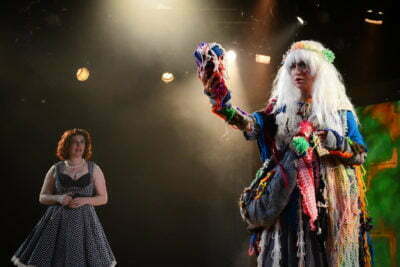
Beside the three Odd-Jobs, there are fourteen actors in the show, all of whom play multiple major and ensemble roles over the entire day. Each of them shine as more than one character, and most of them do so with contrasting parts, such as Walter Briggs turning from cheerful idiot-savant Herakles into the cruel and haunted Agamemnon, or Emily Casey as the stern, ruthless Thíba (a character based on Agave from The Bacchae, who tears apart her son) and the feckless Helen of Troy. Though I was disappointed by how Graney handled a few stories, particularly Phaedra’s, he did a compelling and very clever job of developing certain characters over the course of several hours, especially Kreon and Neoptolemus (both played by Zeke Sulkes), and Antigone (Erin Barlow). In fact, the Theban cycle was my favorite part of the day due to their passionate, deeply complex performances and that of John Taflan as Oedipus, as well as Graney’s revising of The Bacchae into something much more political. The Trojan War is, of course, a wrenching conflict, and the aftermath of Agamemnon’s murder is disturbing, but the Thebes cycle feels like the rise, death, and rebirth of a whole society.
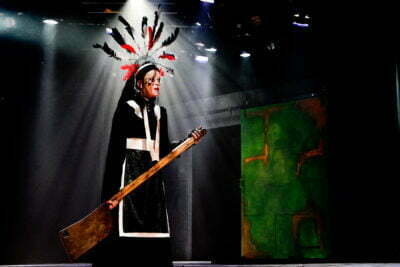
Indeed, Graney was conscious of how retracing mythic chronology took him from pre-civilization to a world of clashing city-states. A constant theme over the twelve hours is the rise of Athenian democracy and the Delian League, conflating the myths depicted in the dramas with the actual society in which they were written, as the ancient tragedians themselves did. This layering gives All Our Tragic a weight and relevance that is enhanced, rather than undermined, by an irreverent sense of humor that sometimes outdoes the original myths in perversity. By the end of Orestes’s flight from the Furies, we have entered the realm of absurdity, and the ensemble prompts us to scrutinize these stories directly for reflections of our values and aspirations. After a build-up of nearly twelve hours, the moment is well-earned, and the audience certainly feels that it has been put through the full range of laughter, sorrow, and moral dilemmas. All Our Tragic is a must-see for fans of the theatre and anyone who ever was interested in classical literature, who I think will be pleased with these new interpretations. There have been several fine adaptations of ancient tragedies this season which show why these stories remain interesting, but All Our Tragic provides the sense of an entire world being passed on.
Highly Recommended
Jacob Davis
[email protected]
Reviewed June 28, 2015
For more information, see All Our Tragic’s page on Theatre in Chicago.
Playing at The Den Theatre’s Heath Main Stage, 1329 N Milwaukee Ave, Chicago. Tickets are $100-150; to order visit the-hypocrites.com. Performances are Saturdays and Sundays at 11:00 am through August 16. Performances are twelve hours long with multiple intermissions and meal breaks. Food from Inspiration Kitchens is included in ticket price. Show contains nudity.
